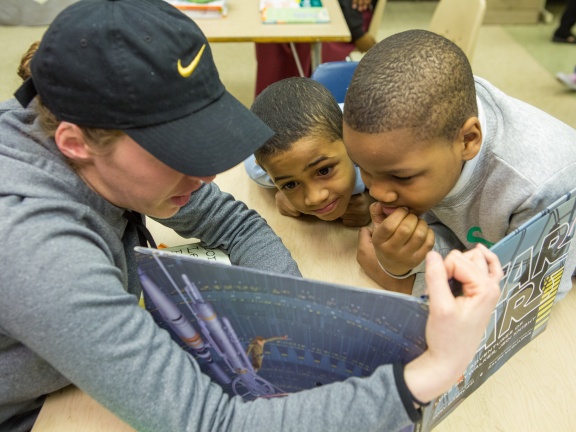Increasing Access to Out-of-School Learning Opportunities

Background
There are decades of research that demonstrate the value of out-of-school time (OST) for children’s learning and development in school and in life.
Youth who participate in high-quality OST opportunities demonstrate improved academic performance in reading and math, grades, school attendance, and engagement in learning. These gains are even greater for youth who are most at risk. However, many children do not have access to these critical learning opportunities. In Philadelphia, there is limited supply of high-quality out-of-school programming. Additionally, OST program costs can be prohibitive, and when basic needs like housing, transportation, and healthcare are at risk, OST participation is low.
Expanding the number of high-quality OST learning opportunities available to Philadelphia children and removing barriers to access (e.g., cost to participate, location of existing programs) will enable more children to participate in programs that expose them to new opportunities, ideas, and experiences.
Opportunity Overview
The William Penn Foundation (WPF) would like to support efforts that increase the number of children, aged 3 to 8, who have access to out-of-school time learning opportunities. Funding will be limited to projects that will positively impact young children, aged 3-8, living in specific neighborhoods in the City of Philadelphia.
An out-of-school time (OST) learning opportunity is defined by WPF as a supervised program that young people regularly attend when school is not in session. Examples of OST programming include academic programs (e.g., tutoring), multi-purpose (e.g., homework help, enrichment), and specialty programs (e.g., art, music, sports, STEM). Programming that takes place during the school day is not eligible for this RFP.
This RFP seeks to support the expansion of year-round (school year and summer) OST opportunities for children ages 3 to 8 (pre-K to grade 3). To be eligible for funding, organizations must provide continuous programming during the school year and summer. Programs that operate solely during the school year or summer are not eligible for funding under this RFP.
We are requesting proposals for up to three years of funding. After reviewing proposals, WPF will conduct site visits and gather additional information from a limited number of organizations.
Organizations that propose projects in partnership with other applicants will be considered on their individual merits. However, the Foundation recognizes that making significant progress on the objective is difficult and encourages organizations to include partnerships that leverage complementary strengths, resources, and expertise to reach proposed goals.
All proposals that meet the review criteria (described on pages 6 and 7 of the full RFP) are encouraged to apply.
WPF has $5.5 million available to advance this objective at this time. There is no minimum or maximum amount of funding that organizations may request. The grant amount requested should be commensurate with the contribution that the project will make to the overall objective.
At least $1 million of the total amount awarded under this RFP will be reserved for grants to organizations that have budgets under $1 million per year and/or are led by individuals who are members of groups with a history of discrimination or exclusion.
Full Request for Proposals (RFP) and Application
Download the full RFP packet for more information about this opportunity including eligibility, review criteria, learning and evaluation, budget, and link to an application template.
All applications must be submitted through the Grants Portal.
Webinar
An informational webinar took place on September 24, 2024: